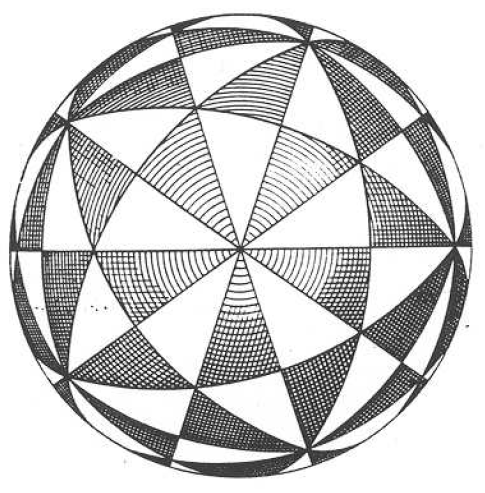Problem
Evaluate
\[\sum_{k=1}^\infty\frac{(-1)^{k+1}}{k}\sum_{n=0}^\infty\frac{1}{k2^n+1}.\]Preliminary Ideas
Before jumping right in and solving the problem, lets look at this double sum and see what hints it contains. The form of the outer sum,
\[\sum_{k=1}^\infty\frac{(-1)^{k+1}}{k}(\text{stuff involving }k)\]is highly suggestive of the Mercator series. So we should expect to take a logarithm at some point. Since we probably have a logarithm and another sum,
\[\sum_{n=0}^\infty\frac{1}{k2^n+1}\]this hints that a logarithm of a product was most likely taken to get this double sum. I had already seen a product involving $2^n$ in the past,
\[\begin{align}\prod_{n=0}^\infty(1+x^{2^n})=\frac{1}{1-x},\;|x|<1\tag{1}\end{align}\]and since we have a $k2^n+1$ appear in a denominator we will probably have to integrate eventually as well. With these thoughts in mind, we can use them to cobble together the given sum. In fact, if we skip all the work justifying the solution and hastily integrate the logarithm of the product from $0$ to $1$, we see that the value we’d expect to get from the sum is $1$. So lets try to prove
\[\begin{align*}\sum_{k=1}^\infty\frac{(-1)^{k+1}}{k}\sum_{n=0}^\infty\frac{1}{k2^n+1}=1.\end{align*}\]Solution
Consider the product
\[\begin{align*}\prod_{n=0}^m(1+x^{2^n}),\end{align*}\]we wish to show that
\[\begin{align}\prod_{n=0}^m(1+x^{2^n})=\frac{1-x^{2^{m+1}}}{1-x}\tag{2}\end{align}\]and we’ll proceed with induction.
Base case: When $m=0$ we have
\[\begin{align*}\prod_{n=0}^0(1+x^{2^n}) &=1+x\\&=\frac{(1+x)(1-x)}{(1-x)}\\&=\frac{1-x^{2^{0+1}}}{1-x}.\end{align*}\]Inductive step: Assume that $(2)$ is true, then
\[\begin{align*}\prod_{n=0}^{m+1}(1+x^{2^n}) &=(1+x^{2^{m+1}})\prod_{n=0}^m(1+x^{2^n})\\&=(1+x^{2^{m+1}})\frac{1-x^{2^{m+1}}}{1-x},\;\text{by assumption}\\&=\frac{1-x^{2^{m+1+1}}}{1-x}.\end{align*}\]So the truth of the $m\text{th}$ case implies the truth of the $(m+1)\text{th}$ case, and the base case implies $(2)$ is true for $m\geq0$. $\square$
Now, let $|x|<1$ and let $m\to\infty$ to get $(1)$. In the remainder of the proof we’ll take $x$ to be in $[0,\,1)$. Taking the logarithm of this infinite product yields
\[\begin{align}-\ln(1-x)&=\ln\left(\prod_{n=0}^\infty(1+x^{2^n})\right)\notag\\&=\sum_{n=0}^\infty\ln(1+x^{2^n})\notag\\&=\sum_{n=0}^\infty\sum_{k=1}^\infty\frac{(-1)^{k+1}}{k}x^{k2^n}.\tag{3}\end{align}\]We’d like to switch the order of summation, so we must verify that the double sum converges absolutely. We work the sum into the following form:
\[\begin{align*}\sum_{n=0}^\infty\sum_{k=1}^\infty\frac{1}{k}x^{k2^n}&\leq\sum_{n=0}^\infty\sum_{k=1}^\infty x^{k2^n}\\&=\sum_{k=1}^\infty x^k+\sum_{n=1}^\infty\sum_{k=1}^\infty x^{k2^n}\\&\leq\frac{x}{1-x}+\sum_{n=1}^\infty\sum_{k=1}^\infty x^{kn}.\end{align*}\]The number of times, $d(m)$, that $x^m$ appears in the last double sum is equal to the number of divisors of $m$, and $d(m)\leq m$. Since all the terms are positive (or $0$) we can rearrange this sum to get the following bound
\[\begin{align*}\sum_{n=0}^\infty\sum_{k=1}^\infty\frac{1}{k}x^{k2^n}&\leq\frac{x}{1-x}+\sum_{m=1}^\infty d(m)x^m\\&\leq\frac{x}{1-x}+\sum_{m=1}^\infty mx^m\\&=\frac{x}{1-x}+\frac{x}{(1-x)^2},\end{align*}\]hence $(3)$ converges absolutely as its partial sums are monotonically increasing and bounded (or the sequence is constant when $x=0$). Knowing this, we may switch the order of summation in $(3)$,
\[\begin{align*}-\ln(1-x)&=\sum_{k=1}^\infty\sum_{n=0}^\infty\frac{(-1)^{k+1}}{k}x^{k2^n}\\&=\sum_{k=1}^\infty\frac{(-1)^{k+1}}{k}\sum_{n=0}^\infty x^{k2^n}.\end{align*}\]Then we can integrate the righ side of the above equality, and push the integral through the sums since we have absolute convergence,
\[\begin{align*}\int_0^1\sum_{k=1}^\infty\frac{(-1)^{k+1}}{k}\sum_{n=0}^\infty x^{k2^n}\,\mathrm dx&=\sum_{k=1}^\infty\frac{(-1)^{k+1}}{k}\sum_{n=0}^\infty\int_0^1x^{k2^n}\,\mathrm dx\\&=\sum_{k=1}^\infty\frac{(-1)^{k+1}}{k}\sum_{n=0}^\infty\left[\frac{x^{k2^n}}{k2^n+1}\right]\Bigg\vert_0^1\\&=\sum_{k=1}^\infty\frac{(-1)^{k+1}}{k}\sum_{n=0}^\infty\frac{1}{k2^n+1}.\end{align*}\]Integrating the logarithm gives
\[\begin{align*}-\int_0^1\ln(1-x)\,\mathrm dx&=\left[(1-x)\ln(1-x)+x\right]\vert_0^1\\&=1,\end{align*}\]yielding
\[\sum_{k=1}^\infty\frac{(-1)^{k+1}}{k}\sum_{n=0}^\infty\frac{1}{k2^n+1}=1\]as desired. $\blacksquare$
